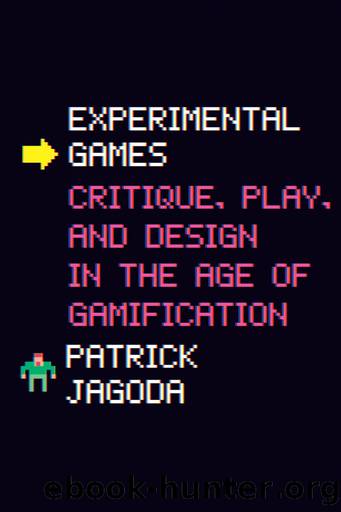Experimental Games by Patrick Jagoda

Author:Patrick Jagoda [Jagoda, Patrick]
Language: eng
Format: epub
Tags: SOC000000 Social Science / General, SOC052000 Social Science / Media Studies, LIT000000 Literary Criticism / General, COM071000 Computers / Digital Media / Video & Animation
Publisher: The University of Chicago Press
Published: 2020-12-07T00:00:00+00:00
Figure 5.1. Difficulty setting menu in Doom (id Software, 1993). Screenshot taken by Stormspirit 86, âDoom 1 (1993),â August 13, 2010, http://www.youtube.com/watch?v=jP2jI0BVG0w.
A third approach to the analysis of mechanical difficulty is a turn to sociological and cultural analysis that considers the constitution of digital gaming publics. Beyond formal and historical considerations, there are countless personal or idiosyncratic reasons that particular players might find a game difficult. Such reasons develop alongside sociotechnical and legal apparatuses that privilege certain bodily capacities while neglecting particular debilities. Indeed, games can only be understood in a situated context that involves genre conventions, controller types, player expectations, abilities, cultures, and access to communication networks. Mechanical difficulty constitutes individual subjects but also importantly produces and delimits publics in a variety of ways.
The broadest scale at which such difficulty encourages inclusivity within emergent publics might be the way that games resonate with and promote fundamental literacies. The advent of digital technology has brought with it literacies that exceed traditional forms of reading and writing. Video games, in particular, introduce a host of new experiences and ways of knowing that Salen, Zimmerman, and others have called âgaming literacy.â25 Many of the abilities marked by this category relate to the process of understanding and navigating the forms of mechanical difficulty that I discussed above. Game designers, researchers, and educators have argued that games foster the types of skills needed for thinking and working in the early twenty-first century. For instance, games cultivate curiosity, motivation, effort, and optimism about the possibility of completing a challenge. Gamers are also positively disposed toward collaborations that allow them to engage in cooperation, coordination, and cocreation.26 Through the difficulties that they create, games allow, even encourage, learning through risk taking and trial and error. Instead of being something to avoid, difficulty becomes a key aspect of the way that video games operate as models and microcosms of contemporary education. Some advocates of the research constellation of digital media and learning have attempted to tap into the motivating capacity of games in order to redesign a broken educational system. In this context, games are often seen as inclusive, even when they challenge their players.
At a smaller scale, mechanical difficulty can also contribute to the maintenance of existing gaming publics and subcultures. In the 2010s, the video game ecology has seen a resurgence in games that pride themselves on inaccessibility and mechanical difficulty. Games that are intentionally designed to be mechanically difficult and limiting in their access have many genealogies. One can certainly turn to earlier arcade games, such as the notoriously difficult Defender (1981) or Robotron 2084 (1982).27 However, an arguably more important development may have been the release of the 1980 computer game Rogue. This game drew on role-playing and text-adventure games but also introduced features such as randomized content, procedural level generation, and permanent death. Rogue initiated the genre of âroguelikesâ that continued in the following decades with games such as NetHack (1987) and The Binding of Isaac (2011). The randomization in these games kept them perpetually fresh and increased their replay value.
Download
This site does not store any files on its server. We only index and link to content provided by other sites. Please contact the content providers to delete copyright contents if any and email us, we'll remove relevant links or contents immediately.
Harry Potter and the Prisoner of Azkaban by J K Rowling(3571)
The Sentinel (Jack Reacher) by Lee Child & Andrew Child(3328)
Harry Potter and the Prisoner of Azkaban by Rowling J K(3119)
The Tales of Beedle the Bard by J.k.rowling (eng)(2719)
Dungeon Crawler Carl by Matt Dinniman(2492)
The Gate of the Feral Gods: Dungeon Crawler Carl Book 4 by Matt Dinniman(2249)
Marauder (The Oregon Files) by Clive Cussler & Boyd Morrison(1939)
Better Off Dead by Lee Child & Andrew Child(1939)
The Other Emily by Dean Koontz(1681)
Migrations by Charlotte McConaghy(1669)
The Girl and the Mountain by Mark Lawrence(1635)
Gild (The Plated Prisoner Series Book 1) by Raven Kennedy(1634)
Mark Z. Danielewski's House of Leaves by Mark Z. Danielewski & Johnny Truant(1624)
A Desolation Called Peace by Arkady Martine(1539)
Ruthless Empire (Royal Elite Book 6) by Rina Kent(1527)
Near the Bone by Christina Henry(1488)
The OP MC: God of Winning by Logan Jacobs(1448)
Fable: A Novel by Adrienne Young(1448)
The Captive by Fiona King Foster(1406)
